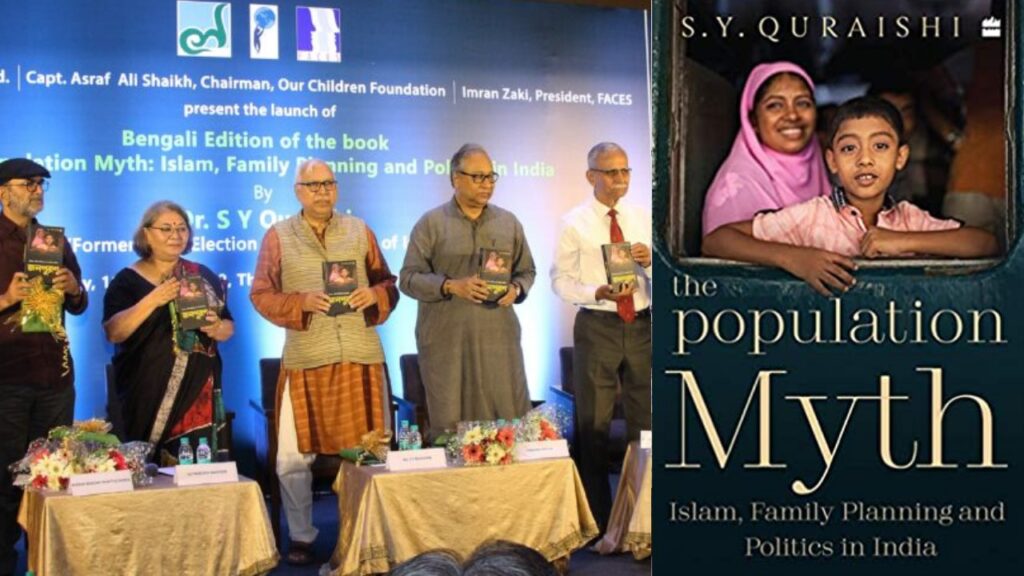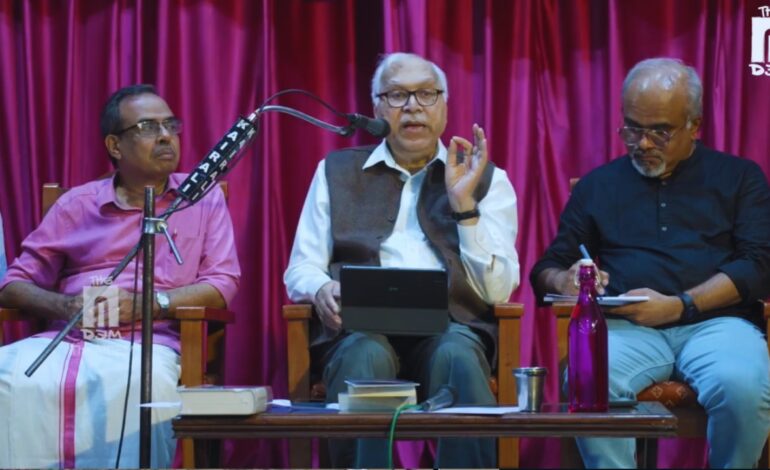This is an edited transcript of Former Chief Election Commissioner SY Quraishi’s speech on the “ One Nation One Election “ proposal. The speech was made recently at Thrissur, Kerala, and is being published in two parts.
The origins of the ‘One Nation, One Election’ had begun with discussions about simultaneous election. This had gone on fir many years and even before Mr. Modi became the Prime Minister. He talked about the idea of holding simultaneous elections in a 2013 (BJP) party meeting, while addressing party workers.
But he was not the first to talk about this idea; in 2010 Mr. L.K. Advani had written about it and even earlier, a Law Commission Report had talked about it. And long long back, Mr. Vasant Sathe of the Congress party had talked about it. So, Mr. Modi actually only flagged the issue and significantly, he asked for a national debate on the subject and for arriving at a consensus.
Debate happened for 10 years, but consensus did not happen. The logical conclusion should have been if there is no consensus you should drop the idea. Then the government decided that even if there is no consensus we are going to push it down the throat of the nation and they brought this bill. They introduced the bill in Parliament which is going to be discussed soon. Which is what makes the subject very topical, although discussion on it has been going on for 11 years.
Now, originally when the Prime Minister talked about it, what are the things he had said? He said the cost of elections is so high and we have repeated elections and it becomes a very costly thing. The cost referred to here means two things– cost to the Election Commission or the government for managing the election, which is just about Rs 4,500 crore. This is nothing for a democracy of our size. We are the fifth largest economy in the world. The other is the cost of politicians with their campaign; in fact that is where the problem lies. There is a law prescribing a ceiling on election expenditure. You can’t spend more than the ceiling, which is revised from time to time.

For Vidhan Sabha it must be about 40 lakhs, but we know for fact that people are spending crores on every election. Whether Panchayat elections or Vidhan Sabha or Lok Sabha, they are spending crores in violation of the law. It has become so that only the rich people can contest. Poor people cannot contest elections anymore now.
One anomaly here is that while the law prescribes a ceiling on individual expenditure, there is no ceiling on expenditure by the political party. If I am a candidate and as a candidate I can’t spend more than 40 lakhs but my party can spend 40 crores on me, so what is the purpose of the ceiling? It gets defeated. So, I have been suggesting that if you are so conscious of the cost why don’t you put a ceiling on political party expenditure? The cost will come down drastically and instead of this long route of ‘One Nation, One Election’, we’ll have an easy solution. But that is not their intention.
Now, as I said initially they used to talk of simultaneous elections but later on they introduced the word ‘Nation’– ‘One Nation’. The moment you talk of nation, our patriotism gets aroused. So, for that purpose One Nation One Election. Now, India is a unique nation. It’s the most diverse country in the world, it’s a mini Commonwealth with 22 official languages. Here (at Thrissur) I was hearing Malayalam, yesterday in Chennai I was hearing Tamil, that is not what we hear in Delhi, we hear Hindi.
So, India is a mosaic of cultures, a mosaic of languages of all varieties and that is the beauty of India. America is a big country also, although it is one fourth of India in size, but from East coast to West Coast, it has the same language. Russia is huge, has 11 time zones, but the same language throughout. But here we have 22 official languages and hundreds of other recognized languages. Every major religion of the world we have in India.
The plurality of India is our asset, it is our unique aspect which we should be proud of and not disturb. But the attempt being made now with One Nation One Election is to carry out this very disturbance.. In fact, in one of my articles, I said that the next slogan will be ‘One Nation, One Political Party’, ‘One Nation, One Leader’. And why have elections every five years? Appoint leader for life. What is this– in the name of One Nation? One nation and many people, one nation and many languages, one nation many cultures– that was our national slogan all through and that is being played around with now and that’s very wrong.
The second reason given for one nation one election or simultaneous election proposal was that it leads to work paralysis, as the work (of the nation) comes to a standstill because of the Model Code. That is a lie. I will request all of you and as many of you who can, please download the Model Code of Conduct. It is 10-12 pages of small reading when you look at the overall functioning of the Election Commission. It does not stop anything, except two things– you cannot announce a new policy and you cannot make transfers after elections have been announced.

Now, you are talking only about a new policy, why is it that they say– because of this Model Code we cannot do public good? We cannot announce policies? Who stopped you from announcing new policies for 4 years and 11 months? Why is it that all the bright ideas for new policies come to your mind 2 weeks before elections? It’s totally illogical. So, nothing really stops.
In fact, when I was in the election commission we have repeatedly called ministers, along with the Cabinet Secretary Mr. Chandrashekhar, who was originally from Kerala. He used to say to please tell the ministries not to stop anything, because the model code doesn’t expect to stop anything, other than new schemes and official transfers. If you have to transfer, you can do it before but not after the elections have been announced.
The other thing or argument is about the party workers’ time. What is party workers’ time for? For electioneering. So, because of the election their work stops. What stops? Maybe the hate speech, maybe the polarization, all the kind of activities which they were doing and are not able to do. But elections are a great opportunity for them to polarize the country, they’re doing it regularly. The important thing is, the Prime Minister mentioned very clearly that when we’re talking of simultaneous elections, we’re talking of all three levels– Lok Sabha, Vidhan Sabha, and the Panchayat. But you would notice if you have been reading the newspapers and watching the media, the debate forgot about Panchayat and they were only talking of Lok Sabha and Vidhan Sabha.
How can you ignore Panchayats? Lok Sabha has 543 MPs, Vidhan Sabha all together have 4,120 MLAs, but Panchayats have 30 lakh members of Panchayat. That is the major part of democracy, how can you brush it aside? Constitutionally they are as important as Lok Sabha elections, but from the debate it disappeared.
Now, after the suggestion was made, a parliamentary committee went into it and they also talked of massive expenditure on Election, and about stoppage of the delivery of essential services. But there are some political leaders here, who would agree that our experience is that during elections, services improve. When an election is being held in the constituency they will make sure you get electricity nonstop. They may cut electricity in the neighboring District and transfer it to you. Everything will improve and to say that because of the election the service delivery gets affected is wrong; it improves and because of so many announcements and the freebies that come along with.
But along with this we should also note that when elections are staggered, it leads to more corruption because money is used in the elections. Unaccounted money, black money, distribution of liquor, etc. Casteism is also promoted; 70 years ago we hardly knew about caste, many people did not even know their caste, and now because of the election they know their sub caste and sub caste within sub caste. Everything they know because that is how the vote banks are created.Communalism also increases; you would have noticed, that close to election communalism increases to polarise the community.
There is a book which I have written– ‘Population Myth’, ‘Islam, Family Planning, and Politics in India’, and here is a small observation which I had made– ‘Are Muslims overtaking the Hindus?’; that is the slogan they are mouthing constantly – ‘you know the Muslims are going to overtake 80% of the people’, the Hindus are being made scared of 14% people. This is unique in the country, 80% of people are scared of 14%, a small segment of people. Every day they say, ‘these guys, they will kill you’, and it is leading to polarisation. Polarisation has become a winning electoral strategy.

Now, the arguments against– I was attending one meeting where Biju Janata Dal MP, Mahtab, made a very interesting statement. Now he is in the BJP; he said– ‘…have we asked the people? What do people want?’. He said, people love frequent elections. Why? Because for most poor people, this is the only power they have. At least because of the election the leaders come with folded hands to their door, otherwise we have seen how many times the MLAs and MPs go missing for 5 years, they don’t come back. People have to put posters in the streets– “missing, finder will get 50,000 Rupees”, because they never come back. But, at least on account of frequent elections of all kinds, they come back to your door. Therefore, free staggered elections actually is not a bad idea.
Now, the estimate of the 2019 election by the Center for Media Studies was Rupees 60,000 crores were spent by the political parties. Personally, I feel that this expenditure is not a bad idea, this is recycling of the politician’s money which goes to the poor, to the labourers, to the auto drivers, to the people who make posters. At least the money is being circulated instead of lying in trunks and suitcases of the politicians. And what is 60,000 crores? No big deal. In any case, I’ve told you that if you really want to reduce spending, that is to device ways and means to cut political party expenditure.
End of part 01. Part 02 to be published on 4 February 2025
Full Speech is available on The AIDEM YouTube Channel
The Article was first published on The AIDEM

